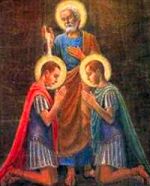Newman’s Final Argument
By Dr. Jeff Mirus ( bio - articles - email ) | Nov 18, 2009 | In Reviews
At the risk of boring those who never intend to read the book, I should add one final point concerning The Meaning of Newman’s Grammar of Assent. It is an important point because, once Newman has established how it is that a human person comes to the truth of things, he immediately turns to making his own argument for the truth of the Catholic Faith.
Newman explores the nature of human judgment under various aspects in the first nine chapters of the book, or some 300 pages in my edition. But having explained at length how we all think, how we evaluate probabilities, and how we come to conclusions, he takes up a powerful argument for Catholicism which depends on precisely the mental principles and operations he has so brilliantly elucidated. This argument is developed in Chapter 10, “Inference and Assent in the Matter of Religion”, and it occupies the final 79 pages of the book.
If you have little interest in the lengthy analysis of the modes of human inference, assent, conviction and certitude, the final point I need to make is that the last chapter is well worth the price of admission for the book as a whole. Newman’s argument is deceptively simple. He asserts first that natural religion leads men to understand there is a God who is both creator and judge, whom we seek to know but cannot, and from whom we therefore expect a revelation. Second, he asserts that that Christianity (and Catholicism in particular) is the only religion that makes a credible claim to being founded upon such an expected revelation, and that it admirably fulfills in every particular exactly what naturally religious persons expect a true revelation to do.
I need hardly add that the argument is made with remarkable learning and still more remarkable perception, both of which are brilliantly displayed through Newman’s unfailingly powerful and expressive prose. Chapter Ten may be a bit of an exercise for many, but it is an exercise to make the religious mind supremely fit. Any Christian who samples it will be the richer. Any who completes it will be the wiser: Deeper in understanding, more robust in faith.
All comments are moderated. To lighten our editing burden, only current donors are allowed to Sound Off. If you are a current donor, log in to see the comment form; otherwise please support our work, and Sound Off!








